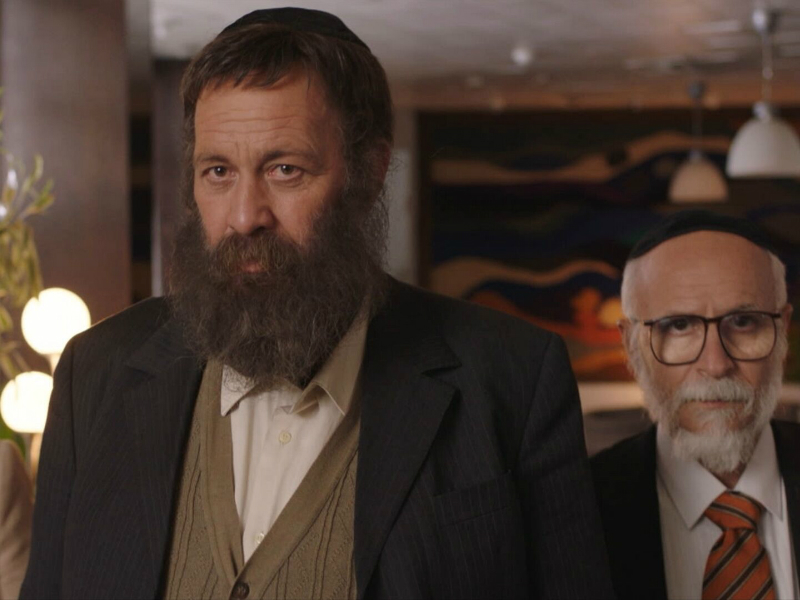Montreal Israeli Film Festival (MIFF) co-chairs Chantal and Gérard Buzaglo proved prescient in including the documentary King Bibi: The Life and Performances of Benjamin Netanyahu in the lineup of 16 films running from May 26 to June 5 at the Cineplex Forum.
Each year, the movie-loving couple starts working, on a voluntary basis, months in advance, combing through the latest films, to decide which ones to select. They could only guess at the outcome of the April 9 election, which has left Netanyahu poised for a fifth term as Israel’s prime minister.
Now in its 14th edition, the ever-growing MIFF is a project of the Communauté Sépharade Unifiée du Québec. Last year, over 4,200 tickets were sold.
King Bibi is a fascinating portrait constructed from footage of Netanyahu’s media appearances over the decades. Filmmaker Dan Shadur traces Netanyahu’s evolution from an awkward and dishevelled spokesperson in Israel’s mission in Washington, D.C., in the early 1980s, to a political powerhouse.
Netanyahu’s masterful political instincts shine through as he perfects his speaking skills and shapes his public image. Initially, that meant television; today, he uses social media to even greater effect.
MIFF 2019 offers 13 features and three documentaries for a total of 21 screenings, which are preceded by eight shorts by Jerusalem Foundation student award winners. All include English subtitles.
Five are also shown with French subtitles, which are harder to come by. They include the opening film, The Unorthodox, which will shown simultaneously in the two languages on May 26, following a red carpet ceremony.
After his daughter is expelled from a prestigious religious school for no reason other than her ethnicity in the 1980s, an Orthodox Sephardic man decides to run in the Jerusalem municipal election and establishes Israel’s first ethnic-based political faction.
Unorthodox is inspired by the actual story of the founding of the ultra-Orthodox Shas party.
READ: BLUE MET TO EXPLORE ISRAELI-PALESTINIAN CO-EXISTENCE
The films are all “powerful,” the Buzaglos note, and many of them raise political and social issues, or deal with troubled family relationships.
The couple’s coup de coeur is the closer, Noble Savage. “It’s like a Greek tragedy in modern times,” says Chantal Buzaglo.
Directed by Marco Carmel, Nobel Savage is about a 15-year-old boy with an eating disorder who lives in a rundown neighbourhood in south Tel Aviv with his mother and her husband, both of whom are former drug addicts. His eccentric alcoholic father is an unemployed artist.
The boy desperately tries to reunite the family and, at the same time, escape their ruinous fate.
Two of the films deal with the subjects of gender identity and sexual harassment.
The documentary Family in Transition by Ofir Trainin follows the journey of a father of four who comes out as a transgender woman. His wife decides to stick with him and the family stays together despite the stigma, believing that their love will triumph.
In Aviad Michal’s Working Woman, a young mother is excelling in her job as an assistant to a high-powered realtor – until his flattery turns into unwelcome advances.
Films reliving painful memories that are particular to Israel include: the documentary The Ancestral Sin, in which David Deri exposes the Jewish Agency’s practice of settling Sephardic and Mizrachi immigrants in the poorest areas of the country in the early 20th century; and the docu-drama Rescue Bus 300 by Rotem Shamir, which recalls the 1984 terrorist hijacking of an Egged bus and the 41 passengers who were taken hostage.
For a contemporary take on the immigrant experience, there’s Here and Now, Roman Shumunov’s unsparing depiction of the struggles of a young immigrant living in a slum in Ashdod.
The closest film to a comedy is Tel Aviv on Fire by Palestinian Sameh Zoabi, who uses satire to illustrate how politics permeates even the most unlikely situations in Israeli life.
The film is about a young Palestinian living in Jerusalem who writes for a popular TV soap opera called Tel Aviv on Fire, which is produced in Ramallah for a Palestinian audience, but is liked by Israelis, too. The series is set in 1967, just months before the Six-Day War, and involves a supposed liaison between a female Palestinian spy and an Israeli general.
One day while passing through the checkpoint to get to his job, the Israeli commander, whose wife is a big fan of the show, suggests a new plot twist that would change the season finale. However, the pro-Israel outcome does not go down so well with the series’ producers.
MIFF bestows five prizes whose winners are chosen by a jury, which is chaired this year by veteran actor and singer Carole Laure, an officer of the Order of Canada. Quebec film industry pioneer Mel Hoppenheim is the honorary festival president.
In addition to bringing the best of new Israeli cinema to Montreal, MIFF seeks to forge cultural links between Israel and Quebec.
The Buzaglos are pleased that last year’s jury chair, Roger Frappier, who has produced over 50 films, was so impressed by what he saw that he agreed to sit on the jury of the Haifa Film Festival this September.
For more information, visit fcim.ca.
